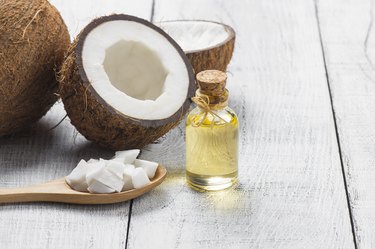
Capric acid is a medium-chain fatty acid found in saturated fats. Small amounts are present in cow's milk and goat's milk, but it is abundant in tropical oils such as coconut oil and palm kernel oil.
Caprylic acid is a fatty acid that is found naturally in coconut and breast milk. This saturated fatty acid, also known as octanoic acid, is also present in butter and palm oil. Find out about the health benefits of caprylic acid and capric acid.
Video of the Day
Video of the Day
Capric Acid Benefits
Capric acid has strong antimicrobial properties. Capric acid is converted into monocaprin in the body, where it can help combat viruses, bacteria and the yeast Candida albicans.
Solutions containing monocaprin may be used as a denture disinfectant per an older June 2009 study in the Scandinavian dental journal Acta Odontologica Scandinavica.
2. Energy
Saturated fats comprise long-chain fatty acids (LCTs), which undergo a long digestive process in your body and are not a healthy energy source. Medium-chain triglycerides (MCTs) such as capric acid are broken down quickly and processed in the liver, and can be used as a source of energy to power your workouts.
In fact, when athletes ate food with MCTs instead of LCTs for two weeks, they were able to work out for longer and harder, according to a small, older 2009 study in the Journal of Nutritional Science and Vitaminology. However, more research needs to be done to confirm these findings.
3. Weight Loss
MCTs such as capric acid may lead to assist fat and weight loss, according to a January 2023 study in the Journal of Translational Medicine. You should discuss any weight-loss plans with your doctor, including proposed dietary changes and exercise. Never take any supplements without your doctor's approval.
4. Acne
Capric acid was shown as an effective treatment for acne thanks to its anti-inflammatory properties, per a March 2014 study in the Journal of Dermatological Science.
Caprylic Acid Benefits
1. Intestinal Candida Fighter
Problems associated with an overgrowth of Candida albicans (a yeast fungus) in your gut include worsening symptoms of digestive conditions (think: ulcerative colitis and Crohn's disease), according to the Mayo Clinic.
As a yeast-fighting agent, it is theorized that the anti-fungal activity of caprylic acid dissolves the cell membrane of the candida yeast cells and causes them to die off, per an older 2011 study in Acupuncture & Electro-Therapeutics Research.
As always, before beginning this or any other supplement, check in with your health care provider.
2. Skin and Mouth Infections
External yeast infections come in various forms, such as vaginitis, which causes vaginal burning and discharge, or thrush (aka oral candidiasis), which leads to white spots in your mouth and tongue, according to the Cleveland Clinic. These, and other infections caused by an overgrowth of yeast, are known as candidiasis.
Taken orally, caprylic acid's yeast-fighting agents may work to dissolve the cell walls of the fungus that cause these external infections.
All in all, more research is needed to confirm these health benefits.
- "Acta Odontologica Scandinavica"; Antimicrobial Activity of Monocaprin: a Monoglyceride with Potential Use as a Denture Disinfectant; Thorunn Orst Thorgeirsdottir, et al.; February 2006
- "American Journal of Clinical Nutrition"; Weight-Loss Diet That Includes Consumption of Medium-Chain Triacylglycerol Oil Leads to a Greater Rate of Weight and Fat Mass Loss Than Does Olive Oil; M.P. St-Onge, et al.; March 2008
- Foundation For Alternative and Intergrative Medicine; Things You Probably Didn't Know About Coconut Oil; Rachale Baseley
- Journal of Nutritional Science and Vitaminology: "Effect of Ingestion of Medium-Chain Triacylglycerols on Moderate- and High-Intensity Exercise in Recreational Athletes"
- Obesity Research: "Medium-chain triglycerides increase energy expenditure and decrease adiposity in overweight men"
- Journal of Translational Medicine: "Supplementation with medium-chain fatty acids increases body weight loss during very low-calorie ketogenic diet: a retrospective analysis in a real-life setting"
- Cleveland Clinic: "Candidiasis"
- Mayo Clinic: "What is a candida cleanse diet and what does it do?"